Bitcoin
Jaw-Dropping Energy Difference Between PoS Altcoins and Bitcoin

How green is crypto, really? Activists accuse the industry of environmentally-hazardous side effects, but how true are these claims? What is the environmental impact of crypto?
A new report from UCL, alongside an exclusive interview, addresses these questions and more.
Mining Costs
The alleged environmental costs of Bitcoin and cryptocurrency are an enduring thorn in the industry’s side. Prominent actors frequently debate controversial claims, but crypto enthusiasts are quick to dispute the harshest assertions.
Studies from reputable scientific agencies have repeatedly claimed that mining harms the environment, and this sentiment translates into political anti-crypto sentiment. However, news coverage frequently ignores the community’s best efforts, and exaggerations run rampant.
How can one make sense of all this? What are the charges of crypto’s environmental impact, and how serious are they?
To help answer some of these questions, BeInCrypto conducted an exclusive interview with Wes Geisenberger, VP of Sustainability and ESG at Hedera, a decentralized public ledger and stablecoin issuer. The firm seeks to stand above its Web3 competitors in terms of carbon footprint and sustainability.
Interestingly, Hedera is a partner of the UCL Centre for Blockchain Technologies, whose new reports on crypto’s environmental impact cast doubt on the proof-of-stake model altogether.
PoW or PoS
The heart of UCL’s new report is on the notion that Proof-of-Stake (PoS) blockchains are uniformly more environmentally friendly than Proof-of-Work (PoW) ones.
PoW protocols like Bitcoin are fully trustless and decentralized, and transactions are validated through a competitive network of miners. These equations solved by miners’ collective computing power update the blockchain and generate new coins, but different miners have an inherently adversarial relationship.
For PoS protocols like Ethereum, however, the blockchain processes transactions differently. Using validators instead of miners, new block creators must “stake” their own tokens rather than computational power, allowing for a more collaborative experience. This, allegedly, makes the mining experience more efficient.
Read more: Proof of Work and Proof of Stake Explained
According to PoW advocates, the main drawback of the latter system is that it is much more prone to centralization. Nonetheless, UCL’s new report seeks to interrogate these claims more closely.
Are all PoS blockchains created equal? If these protocols are greener than PoW, how much greener are they? What are the best ways that the industry can face these challenges head on?
As far as Geisenberger is concerned, the entire space “has a responsibility to understand its impact on the world around us and in particular the environment.” He added that “we need to measure our impacts like the rest of the financial and technology world, built on standards and in an easily comparable way. There’s also a need to extend that to better understand the impact of how technologies, treasuries, and users leverage their resources to achieve positive impact.”
If the crypto ecosystem wants to impact our natural ecosystem, attitudes like this are crucial.
Bitcoin’s Waste
Some of the bitterest arguments over crypto’s ecological impact center around Bitcoin, the first and largest cryptocurrency. The debates over Bitcoin often take place on the same well-trodden territory: what percentage of mining electricity is renewable? Do techniques like flared gas mining constitute green energy or not?
Bitcoin’s biggest advocates are quick to point out all the massive green energy use cases that literally power the industry. Hydroelectric operations can sell excess energy in low-demand periods, productively using clean power that would otherwise go to waste. Flared gas mining is similar, with an inevitable waste product of the petrochemical industry getting a new use.
Aren’t Bitcoin’s critics eager to paint its impact in the most damning light possible? That may or may not be true, but UCL asserts that even the rosiest picture is still pretty grim.

As the data shows, Bitcoin stands head-and-shoulders above all PoS blockchains surveyed in terms of electrical consumption. The study concluded that “all of the PoS-based DLTs (Distributed Ledger Tokens) analyzed have an energy consumption that is negligible compared to that of major PoW blockchains. To the extent that energy consumption may be considered problematic, this is not an issue in any PoS design.”
The study lists a number of limitations in its methodology and was not able to nail down a primary cause for these discrepancies. Still, as Geisenberger put it, “task forces across the industry [are] created to answer difficult questions in increased regulatory and voluntary disclosures in carbon accounting.”
A wide range of organizations are tackling these and other questions, and their results contribute to a greater scientific consensus.
Looking Forward
Ultimately, environmental impacts in the industry are a very controversial issue, and bad-faith actors exacerbate it. Both pro- and anti-crypto advocates can twist meanings and misinterpret studies, especially for concrete political ends.
PoW supporters have legitimate concerns besides the environmental, too, further complicating the issue. If PoS blockchains are not truly decentralized, does it matter if their energy consumption is lower? If PoW consumes energy that would otherwise be “wasted,” are its higher costs negated?
The crypto community must grapple with these and other questions for years to come. Luckily, with an innovative spirit and dedicated researchers like those at UCL, we’re sure to meet the challenge.
Disclaimer
Following the Trust Project guidelines, this feature article presents opinions and perspectives from industry experts or individuals. BeInCrypto is dedicated to transparent reporting, but the views expressed in this article do not necessarily reflect those of BeInCrypto or its staff. Readers should verify information independently and consult with a professional before making decisions based on this content. Please note that our Terms and Conditions, Privacy Policy, and Disclaimers have been updated.
Bitcoin
Bitcoin Drops as China Escalates Trade War With 34% Tariff on US

On April 4, 2025, China responded to the latest US tariff imposition by imposing an additional 34% tariff on all goods imported from the US. This escalates the already tense trade war between the two largest economies in the world.
Bitcoin dropped 3% within hours of the announcement, briefly falling below $82,000. This latest development has caused concern among investors, analysts, and participants in the cryptocurrency sector about its potential impact.
Bitcoin Investors Worry About The Escalating Trade War
According to Xinhua News Agency, China will impose a 34% tariff on all products imported from the US starting April 10. Xinhua reported that the US’s “Reciprocal Tariff” violated WTO rules, severely damaging the legal and legitimate rights of WTO members and undermining the multilateral trade system and the international trade order based on rules.
“This is a typical act of unilateral hegemony that harms the stability of the global economic and trade order. China firmly opposes this,” The spokesperson for the Ministry of Commerce said in an interview about China’s lawsuit against the US’s “Reciprocal Tariff” at the WTO.
Previously, President Trump had imposed a 34% tariff on China in addition to the 20% tariffs already imposed in two phases. This means a total of 54% tariffs were applied to China.
News from China has caused concern among crypto investors. On April 4, Bitcoin’s price dropped from $84,600 to $82,000, a 3% decrease.
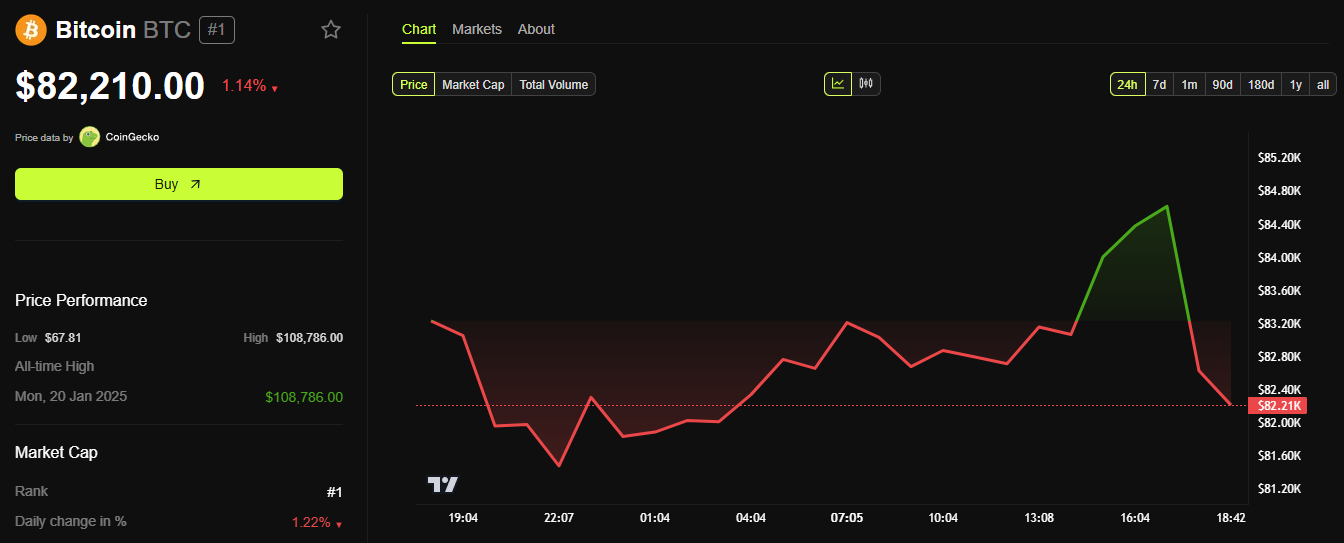
At the same time, following the news, the Long/Short ratio of Bitcoin dropped below 1, indicating a growing sentiment for short-selling, which has become dominant in the market.

Both Bitcoin and other markets have been affected. The S&P 500 fell from 5,260 points to 5,250 points, while the Dow Jones Industrial Average dropped from 41,100 points to 40,500 points. China’s actions have raised concerns about the potential escalation of the global trade war.
“The ‘Third World War’ of the trade war has begun,” The Kobeissi Letter commented.
What Will Happen to Bitcoin When The US-China Trade War Escalates?
This cryptocurrency, often praised as a hedge against economic instability, tends to behave like a risky asset during sudden uncertain periods. Historical patterns support this reaction—during the US-China trade war in 2018-2019, Bitcoin experienced significant sell-offs as tariffs escalated, only recovering when the narrative of value preservation took precedence.
A significant portion of the global cryptocurrency hardware supply chain comes from China, where companies like Bitmain dominate the production of ASIC mining machines—important devices for Bitcoin mining.
With the US now facing a 34% tariff on technology imports from China, the cost of importing these mining machines is expected to rise dramatically. Bitcoin miners in the US, already facing high energy costs and competitive pressure on hashrate, may see their profits shrink further.
However, the long-term outlook for Bitcoin may not be as bleak as the initial market reaction. Some analysts suggest that prolonged trade wars and economic friction could enhance Bitcoin’s appeal as a decentralized asset unaffected by government intervention. If tariffs lead to inflation or weaken fiat currencies like the USD, investors may turn to cryptocurrencies as a safe haven.
“It’s not gold, and it’s not the yen. Instead, Bitcoin is emerging as a risk-dynamic asset – one that doesn’t crumble like high-growth stocks but also doesn’t attract the same flight-to-safety flows as traditional safe havens,” Nexo Dispatch Editor Stella Zlatarev told BeInCrypto.
This sentiment aligns with research indicating that instability often causes initial price drops but can pave the way for growth as acceptance increases.
Disclaimer
In adherence to the Trust Project guidelines, BeInCrypto is committed to unbiased, transparent reporting. This news article aims to provide accurate, timely information. However, readers are advised to verify facts independently and consult with a professional before making any decisions based on this content. Please note that our Terms and Conditions, Privacy Policy, and Disclaimers have been updated.
Bitcoin
Fresh $36M Bitcoin Transfer By Bhutan Sparks Speculation—Dump Alert?
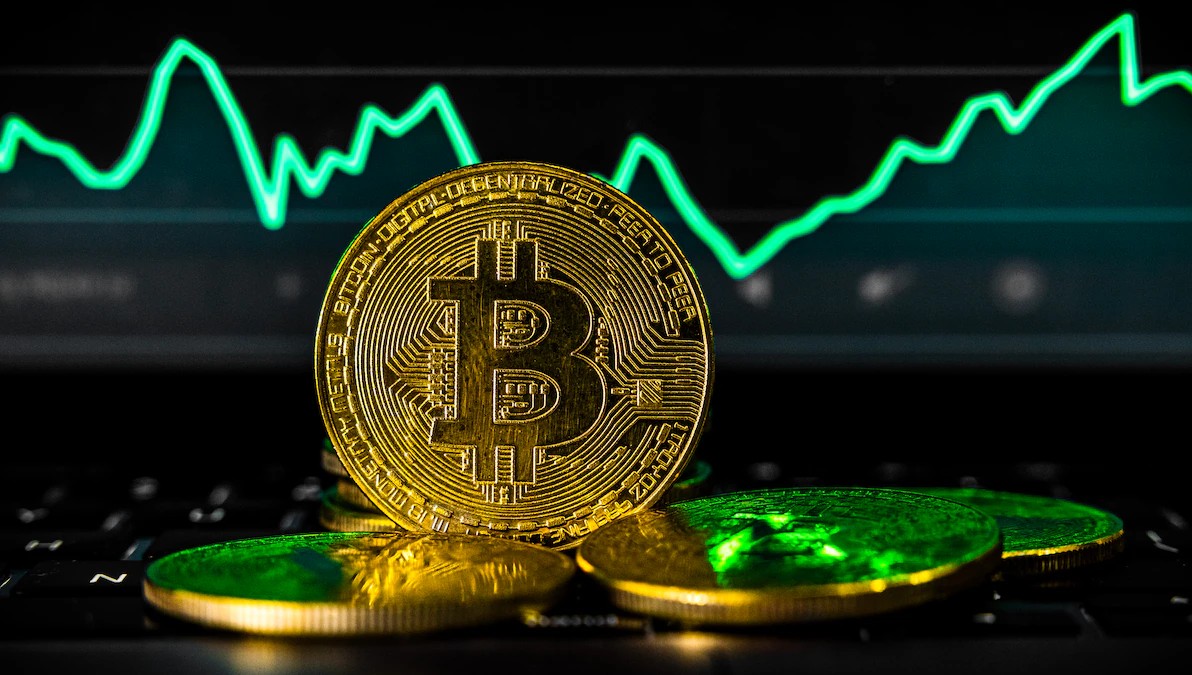

A series of Bitcoin transfers from wallets linked to the Bhutanese government has caught the attention of cryptocurrency watchers. According to blockchain data from Arkham, addresses tied to Druk Holdings, the commercial arm of Bhutan’s government, moved 419.5 Bitcoin worth approximately $34.51 million to an unidentified address on April 2.
Government Wallets Transfer Large Sum To New Address
Based on reports from Arkham, a blockchain analytics platform, two separate wallets believed to belong to the Bhutanese government participated in the transfer. The main Bitcoin holding wallet sent 377.8 BTC ($32.11 million) to a new address identified only as “bc1qn6.” A second wallet, labeled “34oXLr,” contributed an additional 41.7 BTC ($3.5 million) to the same destination.
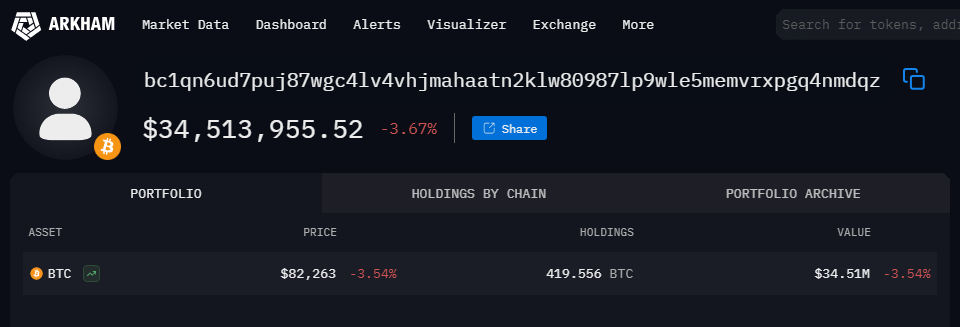

Source: Arkham
The funds remain in the new wallet at the time of this report. This movement follows a larger transfer last week when the government reportedly shifted 1,664 BTC ($144.57 million) to several different addresses.
Bhutan Maintains Significant Crypto Holdings
The Royal Government of Bhutan owns significant Bitcoin holdings, despite recent sales. Bhutan, based on Bitcoin Treasuries data, owns 13,029 BTC at a value of $1,061,269,247. This puts the nation fourth in total Bitcoin owned among countries, just behind El Salvador.

Source: Bitcoin Treasuries
The landlocked Buddhist-majority country has emerged as an offbeat contributor to the cryptocurrency world. Bhutan reportedly mines Bitcoin by leveraging its abundant hydroelectric resources. This most recent stockpile of cryptocurrency constitutes a sizable portion of the total economy — 31% of the country’s gross domestic product (GDP), estimated at nearly $3 billion.
Market Response Following The News
The cryptocurrency market appears unaffected by Bhutan’s Bitcoin movements. According to price data, Bitcoin recovered from a low of $81,014 to reach $82,005 before slightly pulling back. This represents a 2.5% rebound within a day.
The leading cryptocurrency traded at $82,401 at the time of the report, showing a nearly 1% increase over 24 hours. If this upward trend continues, Bitcoin could achieve its third consecutive positive daily close for the first time since early January.
While Bhutan has been selling off its Bitcoin for profit, the United States is seeking to stop all sales of their balance and even expand it. Interestingly, US President Donald Trump signed an executive order last month to establish a strategic Bitcoin reserve for the nation. In the meantime, senator Cynthia Lummis has filed the Bitcoin Act, seeking to acquire 1 million BTC for the nation.
Featured image from AD, chart from TradingView

Editorial Process for bitcoinist is centered on delivering thoroughly researched, accurate, and unbiased content. We uphold strict sourcing standards, and each page undergoes diligent review by our team of top technology experts and seasoned editors. This process ensures the integrity, relevance, and value of our content for our readers.
Bitcoin
Japanese Company Unveils Plans To Buy Crypto


Enish, a Japanese game developer, plans to buy Bitcoin worth 100 million yen. The company announced this move as part of its growing work with blockchain technology, according to recent reports. This purchase comes at a time when Bitcoin was trading at $81,800, based on CoinGecko data.
Why Enish Is Buying Bitcoin Now
The gaming company’s interest in Bitcoin stems from its work on blockchain games. Enish believes owning Bitcoin will help them better understand the technology behind it. Their game “De Lithe Last Metsoires” already uses blockchain features.
Bitcoin stands as the most well-known cryptocurrency in the market. By owning it, Enish hopes to gain new insights for their technical teams. The company thinks this knowledge will improve how they make games and run their business.
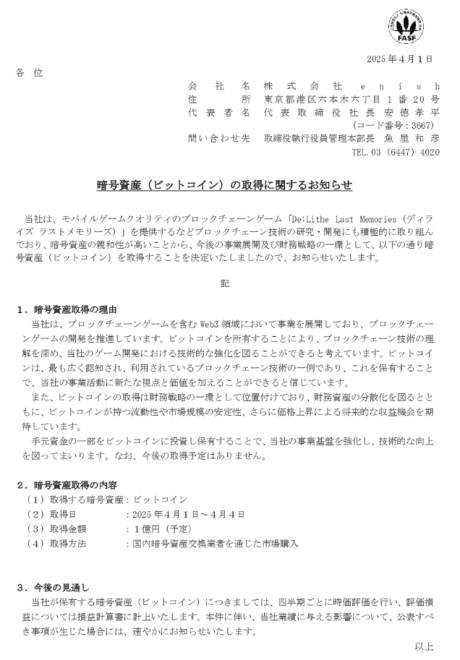
Notice regarding the procurement of Bitcoin. Source: Enish
How And When The Purchase Will Happen
Enish has set clear dates for buying Bitcoin. They plan to make their purchase between April 1 and April 4, 2025. The company will spend 100 million yen through normal market buys on Japanese cryptocurrency exchanges.
JUST IN: PUBLIC JAPANESE GAME DEVELOPER ENISH JUST BOUGHT ¥100 MILLION WORTH OF #BITCOIN
ANOTHER BTC TREASURY 🙌 pic.twitter.com/F2A94hBtFh
— The Bitcoin Historian (@pete_rizzo_) April 2, 2025
This action also aligns with Enish’s asset management strategy. They are looking to diversify their holdings while setting themselves up for potential profits if Bitcoin’s value increases further. The company chose Bitcoin because it’s simple to purchase and sell, and has a big, stable market.
Other Companies Joining The Bitcoin Trend
Enish isn’t alone in buying Bitcoin. Data from CryptoQuant shows public companies added 91,780 Bitcoin to their holdings during the first quarter of 2025.
Tether added nearly 9,000 Bitcoin to its accounts, bringing its total to 92,640 Bitcoin. MicroStrategy (now Strategy), known for its heavy Bitcoin investments, bought another 81,780 Bitcoin. This latest purchase cost the company over $8 billion.
Smaller Players Also Making Bitcoin Moves
More recently, several smaller companies have purchased Bitcoin. Looking more closely at some of these purchases: The Blockchain Company bought 600 Bitcoin. Semler Scientific bought 1,100. Metaplanet also acquired 2,280 Bitcoin in a bigger purchase.
But some companies are raising money to purchase even more. Marathon Digital is raising funds by selling stocks to invest in Bitcoin. In November, GameStop submitted a $1.3 billion offering to initiate its own Bitcoin strategy.
The trend demonstrates increasing acceptance of cryptocurrency among businesses, with more companies diversifying into Bitcoin—often for the same reasons as Enish: blockchain adoption, digital currency growth, and future holdings.
Featured image from Pexels, chart from TradingView

Editorial Process for bitcoinist is centered on delivering thoroughly researched, accurate, and unbiased content. We uphold strict sourcing standards, and each page undergoes diligent review by our team of top technology experts and seasoned editors. This process ensures the integrity, relevance, and value of our content for our readers.
-

 Regulation23 hours ago
Regulation23 hours agoUS Senate Banking Committee Approves Paul Atkins Nomination For SEC Chair Role
-

 Market21 hours ago
Market21 hours agoBinance Managed 94% of All Crypto Airdrops and Staking Rewards
-
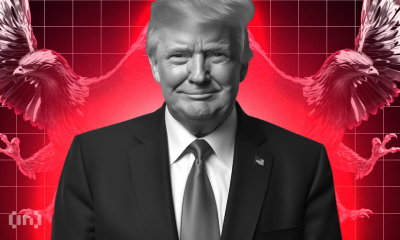
 Market23 hours ago
Market23 hours agoTRUMP Token Hits Record Low Due To Liberation Day Tariffs
-

 Market22 hours ago
Market22 hours agoPi Network Price Falls To Record New Low Amid Weak Inflows
-

 Regulation20 hours ago
Regulation20 hours agoUS SEC Acknowledges Fidelity’s Filing for Solana ETF
-

 Market20 hours ago
Market20 hours agoXRP Battle Between Bulls And Bears Hinges On $1.97 – What To Expect
-

 Market19 hours ago
Market19 hours agoRipple Shifts $1B in XRP Amid Growing Bearish Pressure
-

 Market18 hours ago
Market18 hours agoWormhole (W) Jumps 10%—But Is a Pullback Coming?




















